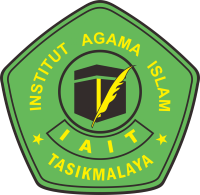Humans as Noble Creatures, Caliphs, and Educators: Studies in Islam
DOI:
https://doi.org/10.61166/kasyafa.v1i2.36Keywords:
Noble Creatures, Essence of Humanity, Educable and Educators, Stewards on EarthAbstract
The research titled " Human as a Noble Being, Caliph, and Educator: A Study in Islam " aims to explore and understand Islamic views on the essence and role of humans within spiritual and social contexts. This study utilizes a literature review approach, gathering data from the Qur'an, Hadith, relevant books, and exegeses. The data is analyzed using content analysis techniques to identify and elaborate on key concepts related to Islamic perspectives on humanity. The research examines three main aspects: 1) the concept of humans as noble creatures, reflecting the value and honor of humans according to Islamic teachings; 2) the role of humans as stewards on Earth, responsible for managing and maintaining the environment and society in line with Islamic principles; and 3) the capability of humans to be educated and to educate, reflecting the potential for learning and self-development within the framework of Islamic teachings.
References
Amini, A., Nasution, A. L., Hasibuan, J. K., & Rambe, R. (2022). Kedudukan dan Hakikat Manusia Serta Implikasinya terhadap Pendidikan dalam Islam. Jurnal Pendidikan dan Konseling (JPDK), 4(6), 9645-9653.
Surat Al-Isra' Ayat 70: Arab, Latin, Terjemah dan Tafsir Lengkap | Quran NU Online
Hakikat dan Fitrah Manusia dalam Al quran dan hadits ~ Aneka Ragam Makalah
Budiyanti, N., Aziz, A. A., Palah, P., & Mansyur, A. S. (2020). The formulation of the goal of Insan Kamil as a basis for the development of Islamic education curriculum. IJECA (International Journal of Education and Curriculum Application), 3(2), 81-90.
Gada, M. Y. (2014). Environmental ethics in Islam: Principles and perspectives. World Journal of Islamic History and Civilization, 4(4), 130-138.
Komarudin, D. (2020). Pemikiran Murtadha Muthahhari tentang Fitrah Manusia.
Fatimah, A. (2024). Literatur Review Penggunaan Media Al Maktabah Al Syamilah terhadap Pendidikan Agama Islam. Blantika: Multidisciplinary Journal, 2(8).
Harahap, M. (2016). Esensi peserta didik dalam perspektif pendidikan Islam. Jurnal Pendidikan Agama Islam Al-Thariqah, 1(2), 140-155.
Didi Junaidi (2020) Surat At-Tin Ayat 4: Manusia Diciptakan dengan Sebaik-Baiknya
Daulay, N. (2015). Pengantar Psikologi dan Pandangan Al-Qur'an Tentang Psikologi. Kencana.
Surat Al-Insan Ayat 3 Arab, Latin, Terjemah dan Tafsir | Baca di TafsirWeb
https://dalamislam.com/info-islami/hakikat-manusia-menurut-islam
Rajab, K. (2024). Psikologi ibadah: memakmurkan kerajaan ilahi di hati manusia. Amzah.
Azami, H. T. (2020). Keistimewaan Manusia (Analisis Pesan Dakwah Felix Siauw dalam Video Youtube Kajian Islam Rahmatan Lil Alamin). Kontemplasi: Jurnal Ilmu-Ilmu Ushuluddin, 8(1), 1-21.
Shihab, M. Quraish. Manusia dalam Perspektif Islam. Mizan, 2002. h. 45–47
Journal of Islamic Studies. "The Islamic Perspective on Human Dignity." Vol. 25, No. 2, 2014, pp. 110-125
Islamic Studies Review. "Human Worth and Dignity in Islam." Vol. 19, No. 1, 2017, pp. 50-60
Amin, Ahmad. Filsafat Manusia dalam Islam. Pustaka Al-Kautsar, 1999. h.78-80
Schuler, J. J. Environmental Ethics in Islam: An Introduction. Routledge, 2019.h.102-103
Mertokusumo, R. (2020). Pendidikan Islam: Konsep dan Implementasi. Jakarta: Penerbit Kencana.h.85.
Syafii, M. (2017). Pendidikan dan Pengajaran dalam Perspektif Islam. Yogyakarta: Penerbit LkiS.h.78
Anshori, A. G. (2018). Filsafat hukum hibah dan wasiat di Indonesia. UGM PRESS.
Lubis, M. S. A. (2019). Materi Pendidikan Agama Islam. MEDIA SAHABAT CENDEKIA.
Yusup, A. A. (2024). Agama dan Penghormatan pada Martabat Manusia dalam Perspektif Abdullahi Ahmed An-Na'im. JURNAL ILMIAH FALSAFAH: Jurnal Kajian Filsafat, Teologi dan Humaniora, 10(2), 107-123.
Muthmainnah, M., Imam, M. A., Abubakar, A., & Ilyas, H. (2023). Analisis AsbÄ bun NuzÅ «l Ayat-Ayat Ekonomi Melalui Pendekatan Kontekstual. Al-Amwal: Journal of Islamic Economic Law, 8(2), 117-137.
Downloads
Published
How to Cite
Issue
Section
License
Copyright (c) 2024 Wan Muhammad Fariq, Suci Amanda, Dea Anggini

This work is licensed under a Creative Commons Attribution 4.0 International License.












